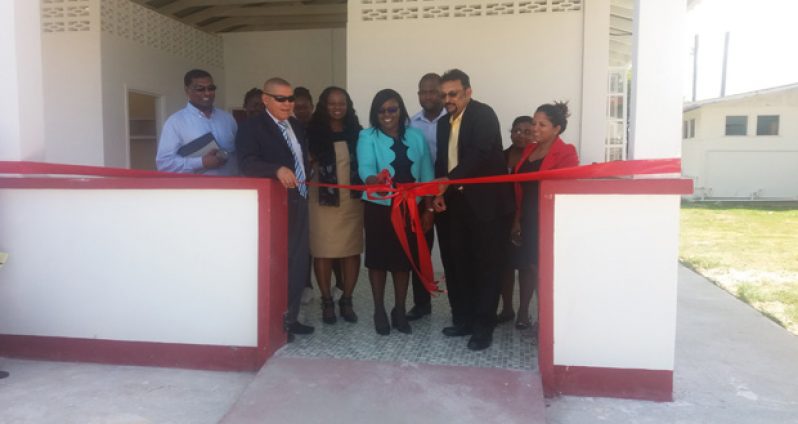OVER the past three years the Tuberculosis (TB) epidemic has shown a form of stability with the incidence on the decline, as regions along with the help of the Ministry of Public Health and other key stakeholders continue to battle it on all fronts.The fight against the disease showed its intensity with Region 3 (Essequibo Islands/West Demerara) being the most recent advocate and employer of actions against the epidemic, as they revealed their newly built chest clinic and the rehabilitated step-down care facility.
Speaking at the unveiling ceremony at the West Demerara Hospital, where the two facilities are housed, Minister of Public Health, Dr. George Norton confirmed that there was some level of stability when it came to containing the spread of the TB epidemic.
“As the number of cases decrease, we aim to ensure that the number of incidence is down from 75 per 100,000 population to 65 per 100,000 population, which will be a great achievement,” said Minister Norton as he outlined the fact that there was a noticeable decrease in the prisons, where in 2015 only nine new TB cases were detected.
However, he made mention of the fact that there was a dire need to establish Regional TB programmes and for them to take ownership of TB control activities in their respective regions. The process has started but more needs to be done in terms of improving coordination and boosting communication with the key stakeholders.
In lauding the region for its achievement, the minister said that the West Demerara TB Chest Clinic had acquired a new building with the support of the Region Three administration, while the TB Step-Down Care facility was refurbished with support from the Centre for Disease Control (CDC), Guyana. This in-patient facility has a capacity of 20 beds, along with two isolation rooms and will be utilised for in-patient management, mainly for TB patients who are infectious, homeless or who have complications.
The architectural layout includes the need for improved ventilation so as to decrease transmission of the TB bacteria. Infection control standards are adhered to in the design, with the necessary remodelling done to suit such a facility, said Dr. Norton.
Programme Manager of the National TB Programme, Dr. Jeetendra Mohanlall, echoed the minister’s sentiments in lauding the region for its achievement and highlighted the fact that check-ups can now be increased to a daily basis rather than the routine twice per month operations of the Chest Clinic.
With the region being the second highest carrier of the disease, this will indeed be a boost to their preventative measures, as they can now work more efficiently from the clinic, as well as conduct more outreaches, especially on the islands in the Essequibo River.
Meanwhile, in light of World TB Day, the minister said that Guyana was waging a strong battle against this public health threat, but this can only be successful with the involvement of all health-care providers and the public at large.
While it is the aim of the Ministry of Public Health to provide improved health care services to those infected and affected by TB, it is even more beneficial to implement preventative measures, where diseases such as TB are concerned, he said.
According to the World Health Organisation, 9.6 million persons fell ill with TB and 1.5 million died from this disease in 2014. Over 95 per cent of deaths related to TB occur in low and middle-income countries and it is among the top five causes of death for women ages 15 to 44.
Persons infected with the TB bacteria have a 10 per cent lifetime risk of falling ill with the disease. However, persons with compromised immune systems, such as people living with HIV, malnutrition or diabetes, or people who use tobacco, have a much higher risk of falling ill.
Children are also greatly affected by this disease, and in 2014, an estimated one million children became ill with TB, resulting in a mortality rate of 140 000 children. As such, ending the TB epidemic by 2030 is among the health targets of the newly adopted Sustainable Development Goals. The Ministry of Finance has allocated a total budget of G$139,716,000 for the new financial year 2016, to combat this disease, an allocation that has been steadily increasing over the past number of years.





.jpg)








